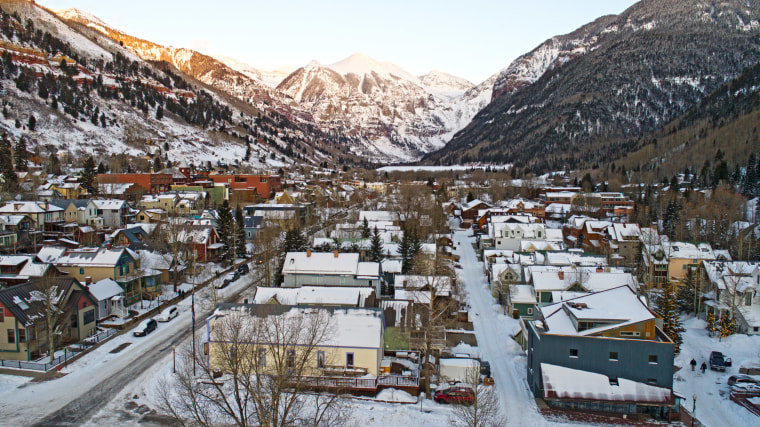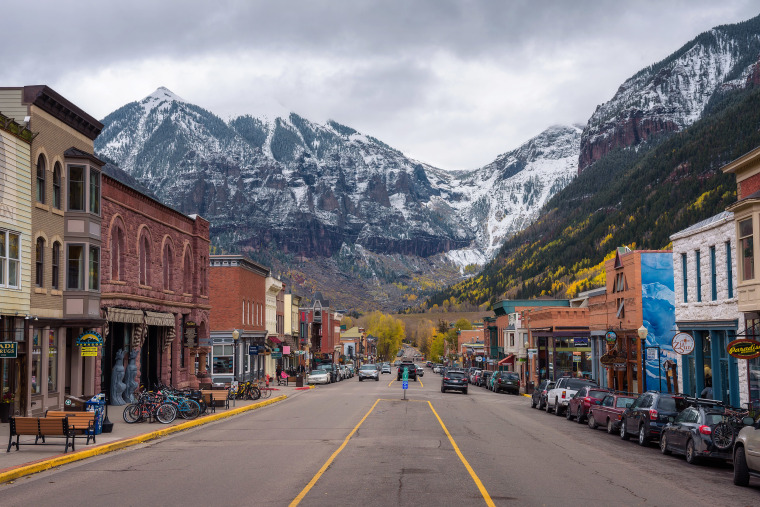TELLURIDE, Colo. — Set in a box canyon surrounded by 13,000-foot peaks, Telluride has long appealed to adventure-seekers and vacationers. But as the Covid-19 pandemic drags on, a balance has shifted: Out-of-towners working remotely have moved in, forcing longtime locals out.
In Silverton, a remote town in southern Colorado, workers are living in campers or cars because they can’t find homes. Others are forced to commute up to 100 miles over mountain passes to get to work or crowd into one-bedroom apartments to afford rent.
In Telluride, there were some days last summer that restaurants had to close their doors because of the number of tourists and lack of employees, said Hayley Nenadal, a filmmaker who lives in the historic town known for its challenging ski slopes and annual film festival.
“You just don’t get coffee anymore, or you just don’t go to dinner anymore, or you just don’t have a place for your friends to gather anymore,” Nenadal said. “The large impact people feel is a loss of community and the loss of quality of life.”
With the pandemic affecting people and institutions across the U.S. in countless ways, housing has become an inflection point for cities struggling to retain their workforces and local businesses. The issue has long been a challenge in Colorado’s mountain communities, but the pandemic has pushed it into overdrive, residents and experts say.

“It took what was a slowly growing problem and made it a rapidly growing problem,” said Jason Peasley, executive director of the Yampa Valley Housing Authority in Steamboat Springs. “It’s very difficult for the local wage earners to compete with those folks that are coming from out of town with significantly higher resources.”
An issue that once affected mostly low-wage earners has moved to the middle class, impacting teachers, police officers and nurses. The situation has forced high-country locales to come up with creative ways to ease the shortage, like limiting the number of short-term rentals in a community or raising taxes on people who own second homes and leave them vacant for long periods of time.
Nenadal and other residents proposed a citizens initiative in 2021 that would have capped the number of short-term rentals in Telluride at just under 600. But voters rejected the plan and instead approved a two-year pause that will keep the number of short-term rental licenses at its current level of 787.
“Housing has such far-reaching consequences,” said Margaret Bowes, executive director of the Colorado Association of Ski Towns, which represents 40 cities and counties. “It’s impacting the level of service that a mountain town can provide to their guests, and that has the potential to really impact the reputation of that town.”
For years, housing authorities and cities have been buying or converting properties to sell to workers at below-market rates. Recently, they’ve begun experimenting with more innovative ideas, such as providing down payment or rental assistance to local buyers; placing deed restrictions on properties so they have to be sold to area workers; placing appreciation caps on properties to keep them affordable over time; and providing cash incentives to property owners to shift from short-term to long-term leases.
Even some business owners are buying properties that they then rent to employees. Eagle County, which encompasses the ski town of Vail in central Colorado, plans to soon launch a loan program for property owners who want to build or renovate accessory dwelling units that would be rented to area workers.
“It really is a struggle,” said Anne Lowe, open space and trails manager for the city of Breckenridge. “It’s rare to find a single-family home under $1 million, and any of those require tons of work.”
Lowe and her husband bought a single-family home in 2019 through Housing Helps, a program in Breckenridge that pays homeowners, buyers and investors to place deed restrictions on their properties guaranteeing they will be used for local housing. Currently, 11 percent of Breckenridge’s housing stock is resident-occupied, but its goal is 35 percent.

Through Housing Helps, Lowe and her husband received 15 percent of the purchase price of their home to use as a down payment, which lowered their monthly mortgage payment and allowed them to save money for needed repairs.
“We didn’t have to stress and pick up second jobs to afford to live close to town,” Lowe said.
A lease-to-locals pilot program that Breckenridge started in October has converted 55 bedrooms from short-term to long-term rentals.
Still, progress is slow. The waitlist for Eagle County’s deed-restriction program jumped from 100 potential buyers to nearly 500 over the last couple of years, said Kim Bell Williams, executive director of the Eagle County Housing and Development Authority.
Some of these efforts may soon get a boost as state lawmakers debate how to spend $400 million in leftover federal Covid relief money, which they’ve earmarked for housing.
Despite these new initiatives, Colorado faces a significant supply shortage. Fading West Development, a construction company in Buena Vista, hopes to help fill that void by manufacturing 600 to 700 modular homes a year in an 11,000-square-foot factory it opened in November.
Buena Vista’s first modular housing community, The Farm at Buena Vista, opened in 2016 with homes built in Nebraska. Fading West is currently pre-building homes for high-country communities throughout the state, including Gunnison, Leadville and Montrose.
“There’s no way you can build affordable housing with the resources in these communities,” Fading West founder and CEO Charlie Chupp said. “There are just not enough electricians, plumbers, general contractors.
“The ability of off-site construction to increase the supply side is critical. … I believe this is the most efficient way to deliver housing.”
Bowes, with the ski town association, said it will take some time to see broad-scale success, but “we know every unit that can be gained is a win.”
CORRECTION (March 7, 2022, 1:20 p.m. ET): A previous version of this article misstated the year a citizens initiative was proposed in Telluride. It was proposed in 2021, not 2020. It also misstated that only one or two restaurants were open last summer. It had more than 60 open through the season.
